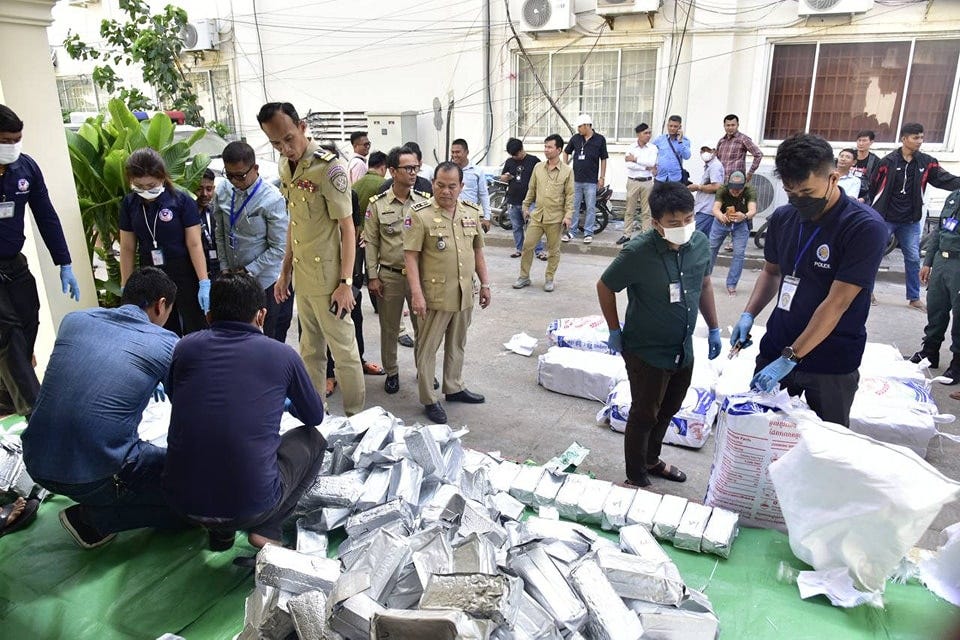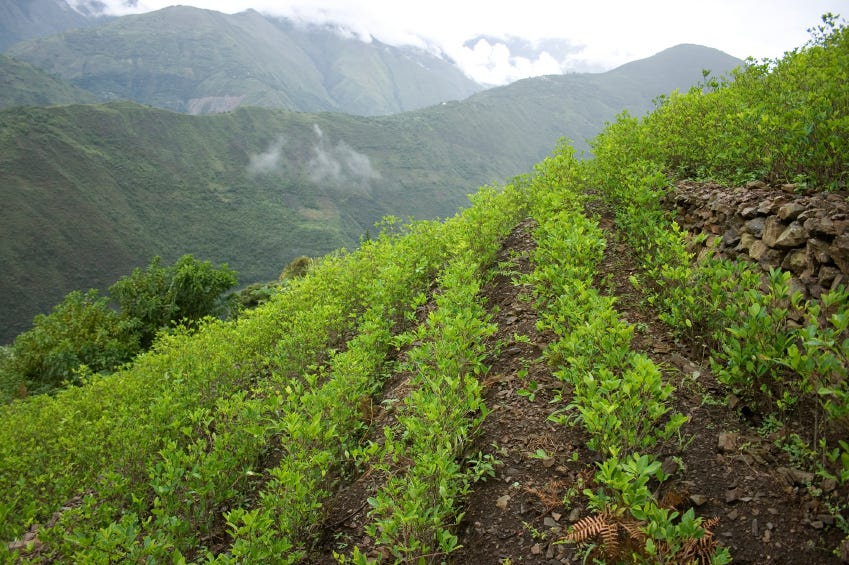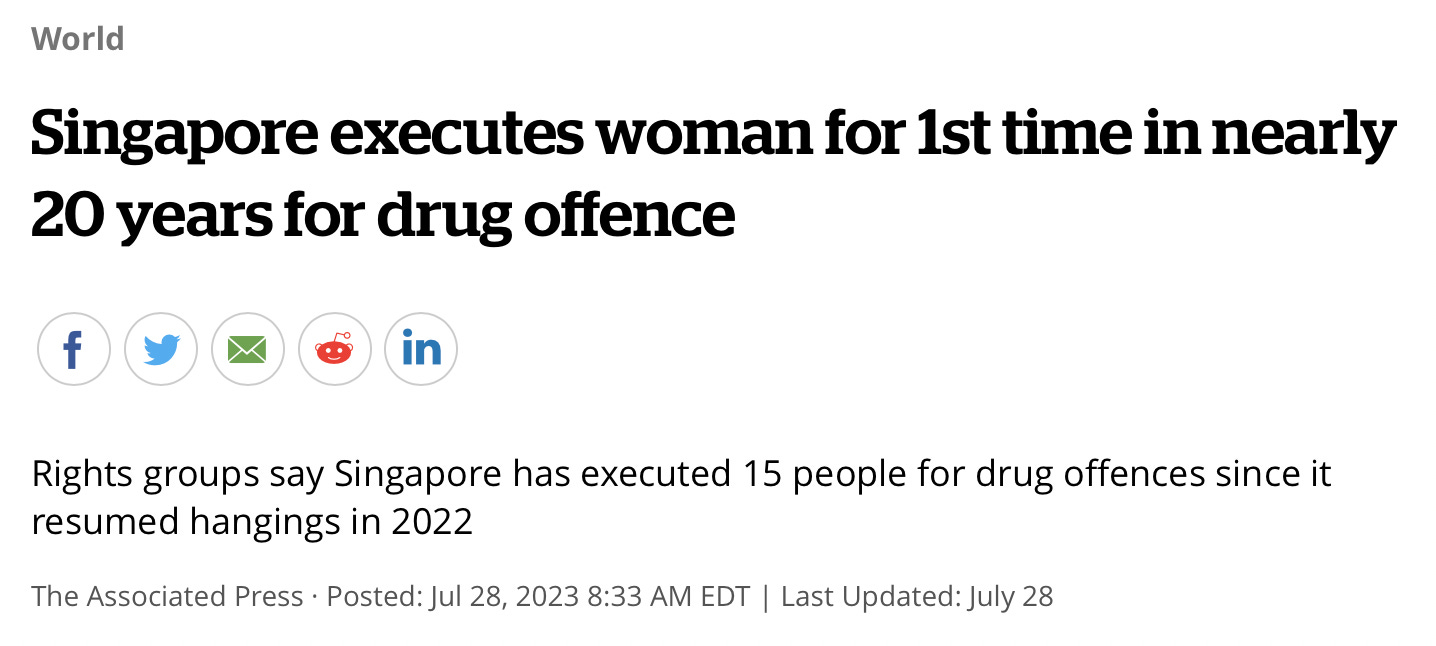Drugism Dispatch #5
Colombia's cocaine economics, Massachusetts psychedelic campaign, stunning volume of ketamine from the Golden Triangle, + more...
Once again, there has been an abundance of drug-related news in recent weeks. In this dispatch, we’ll take a quick look at:
1. Nearly 800 kilograms of ketamine seized in Cambodia—suspected to have come from the Shan region of Myanmar
2. Cocaine economics in Colombia—overproduction has led to steep price decline, a huge issue for rural communities that depend on coca production to survive
3. A new study about heroin and cocaine used samples collected voluntarily at safe consumption sites in Luxembourg
4. A campaign in Massachusetts has filed 2 initiatives to legalize DMT, psilocybin, psilocin, mescaline, and ibogaine
5. Singapore recently executed a woman for drug trafficking
First, a huge THANK YOU to all my readers! I recently sold out of the first printing of Drugism. As if that was not enough of a blessing, when I made the announcement on Twitter/X last Thursday, I promptly received several more orders for the book. A second printing is already in production now and will be ready for shipment within the next week or so. To those waiting on a book, thank you for your patience. As soon as I get my hands on the second printing I will ship out the remaining orders. If anyone else would like a copy, I am still accepting orders on my website. As mentioned, I will resume shipment as soon as I receive the second printing.
Monthly paid subscribers will still receive a copy with 6 months of subscription. New annual subscribers will also receive a copy. If you have been a monthly subscriber for 6 months or are a new annual subscriber, keep an eye out for an email from me.
I am deeply grateful to all of you—whether or not you have purchased a book or subscription. I really could not do this without you. Thank you!
With that, let’s get into the news.
1. Large seizure of ketamine from the Golden Triangle
Approximately 800 kilograms of ketamine were recently seized in Cambodia by the nation’s Anti-Drug Department (ADP). Six people were arrested in the process, none of whom were from Cambodia. The ketamine is suspected to have come from the Shan region of Myanmar, where ketamine production has been rampant for years. The area is part of the Golden Triangle, a region long known for its drug production.
2. Cocaine economics in Colombia
The cocaine market in Colombia is experiencing some major turmoil right now. The country is the world’s leading source of cocaine, so this has implications not only for Colombians who work in the trade but also for people all over the globe who enjoy cocaine. But without a doubt, the impact has been hardest on Colombians—especially the rural populations who farm the coca from which cocaine is extracted.
Cocaine production has accelerated rapidly in recent years, leading to a glut in Colombia. This, in turn, has driven prices down significantly as distributors seek to incentivize demand and move their product. This is bad news for farmers who depend on revenue from coca crops to feed their families.
A recent piece in The Economist breaks the situation down more fully and has been archived here.
3. New study about heroin and cocaine
A new scientific study was recently published that examines the quality, prices, and user expectations of heroin and cocaine. The study was done in collaboration with two safe consumption sites (also known as drug consumption rooms or overdose prevention centers) in Luxembourg. Attendants voluntarily submitted small samples of heroin and cocaine for testing and were asked some questions about their drug use. Check it out here:
4. Massachusetts campaign to legalize DMT, psilocybin, psilocin, mescaline, and ibogaine files 2 initiatives
Two separate but nearly identical initiatives have been filed in Massachusetts by a group known as Massachusetts for Mental Health Options as part of a campaign backed by the New Approach PAC. Both initiatives would legalize the possession of DMT, psilocybin, psilocin, mescaline, and ibogaine. Both would authorize the creation of a commission to oversee regulations and licenses for these substances.
The difference between the two initiatives is that one would allow home cultivation, while the other would not. You can read more about the campaign in this piece by Kyle Jaeger at Marijuana Moment.
5. Singapore execution for heroin trafficking
While a number of countries and jurisdictions all over the world are slowly moving toward more progressive drug policy, many others remain firmly entrenched in drug war politics. Among the latter is Singapore, a country known for its extremely strict drug laws.
Singapore recently executed a woman for trafficking heroin. Her name was Saridewi Djamani, and she had been sentenced to death five years earlier after being arrested with 31 grams of heroin. In Singapore, the death penalty is a mandatory punishment for anyone found with 15 grams of heroin or 500 grams of cannabis.
It had been almost twenty years since Singapore last executed a woman.
If you’d like to learn more about my work (or if you’d dig a drug-themed history lesson), check out this recent interview I did with the wonderful folks at Tripsitter. Rowan Zeoli, J Gordon Curtis, and Justin Cooke asked some great questions as we took a deep dive into the long and complicated history of drug policy. Listen here:
Big thanks to Tripsitter for having me on the podcast!











Drugs rarely arrive to the customer in pure form. When they do people often die...drug cooperatives can stop this trend. Decriminalization removes the crime element from drug use, as it should, now we need to handle creation of a safe supply system, one with purity standards, one that supports high quality at reasonable prices. So filtering out quality from poison is next step.
Drug user cooperatives are the way of the future,...way of the future,...way of the future!
https://joergo.de/ottint_e/